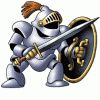Game Design of Dragon & Warriors
Author: Li Wenbo
Email: li.wenbo@whu.edu.cn
Modification: 2014/3/20
1. Introduction
Dragon & Warriors is a poker card game ported from the popular Chinese poker game Dou Dizhu (http://en.wikipedia.org/wiki/Dou_Dizhu). I made some minor modifications. The game is easy to learn but hard to master requiring mathematical and strategic thinking as well as intended execution.
Dragon & Warriors is played among three people with one pack of cards, including the two jokers (54 cards total). The game starts with players bidding for the Dragon position. Those who lose the bid enter the game as the Warrior team competing against the Dragon. The objective of the game is to be the first player to have no cards left.
2. How to play
2.1. Deal the Card
A shuffled pack of 54 cards is dealt to three players. Each player is dealt 17 cards each, with the last three leftover "magic" cards detained on the playing desk, face down. The player who gets these three “magic” cards will become the Dragon!

Figure 1: deal the cards
2.2. Decide the Dragon position
After the cards have been dealt, the next step is to decide who will get the three leftover "magic" cards and become the "Dragon".
All players first review and appraise their own cards without showing their cards to the other players. Then, players take turns to bid for the Dragon position.
The first player to bid is decided randomly. If there is no player bids for the Dragon position, the game will be restarted;

Figure 2: no player bids, the game will be restarted.
Otherwise, the first player bid will become the candidate of Dragon position.

Figure 3: player 1 now is the candidate of dragon
After a player bid, there is one chance for each player to grab the dragon position (excluding player who has decided not to bid. For example, player 2 don't have chance to grab in Figure 3 because he decide not to bid at first).
From the player next to the candidate of dragon position, players take turn to grab the dragon position if he can and he wants.
We continue with the scene in Figure 3 in the following figure, it’s turn for player 3 to make his decision, he decided to grab; player 2 has no chance because he gave up to bid at first; Player 1 decided not to grab. In that case, player 3 succeed in grabbing the dragon position.

Figure 4: player 3 grabs, player 2 don't have chance, player 1 gives up.
The player who finally succeeded in grabbing the Dragon position becomes the Dragon and the remaining players enter the Warrior team competing against the Dragon. The three leftover “magic” cards are then revealed to all players before dealt to the Dragon.

Figure 5: player 3 succeed, he get the three "magic" cards and become the dragon
FAQ: Who should bid and grab for the dragon position and why?
The dragon will get three extra cards which means he may make better hands using these cards, but he has to compete against two warriors on his own. Moreover, the dragon shoulders the risk of loss while the 2 warriors share it. The dragon wins double score while 2 warriors share the same number of points.
As we can see from above, a player who holds a hand of good cards and has confidence to win should bid and grab for the dragon position.
2.3. Game Play
The Dragon plays first following the rules in next section. The Dragon wins if he or she has no cards left. The Warrior team wins if either of the Warriors has no cards left.
3. Game Rules
The game uses the concept of hands, similar to the hands in card game Poker (http://en.wikipedia.org/wiki/Poker) , except there are more variations and not necessarily consisted of only five cards.
There are mainly 9 hand patterns: 
NOTES:
[1] Suits have no effect to the game. Individual cards are ranked:
Colored Joker > Black & White Joker > 2 > Ace (A) > King (K) > Queen (Q) > Jack (J) > 10 > 9 > 8 > 7 > 6 > 5 > 4 > 3
[2] Jokers and 2 are in-consecutive cards. Colored Joker, black-and-white Joker, and 2 cannot be used in any of the Primal cards of the Chains since they are not traditionally considered as the consecutive cards sequentially next to the Ace. Examples of illegal Chain: 2-3-4-5-6, 2-2-2-3-3-3+A-A-7-7
[3] Compare only the Chains with the same length. Beat the prior hand using the same number of cards is a basic doctrine which only the Nuke and the Bomb may violate. For example, although both 9-10-J-Q-K and 3-4-5-6-7-8-9 are solo Chains, 9-10-J-Q-K cannot beat 3-4-5-6-7-8-9, nor vice versa.
[4] The bomb and super bomb are the only hands which can break rule 3. The bomb can beat any other category and individual card except super bomb or another Bomb with a higher or equal rank. The super bomb can beat everything in the game.
4. Scoring
At the beginning of the game, we can set a base score (100 e.g.). The following 4 elements will affect the score in a round:
n Grab: Every time a player grab the dragon position doubles the score in a round.
n Bomb: Each Bomb and Super Bomb dealt by each player doubles the score in a round.
n Role (Dragon or Warrior): The Dragon shoulders the risk of loss while the 2 Farmers share it. The Dragon wins double score while 2 Warriors share the same number of points.
n No deals played: If the player doesn’t deal any card in a round, the final score will be double.
Since there are so many elements affecting score of the game in a round, it is hard to predict how big one will win or lose.
5. Prototype
Here is a prototype I designed for the game playing:
Figure 6: A prototype of the game
http://www.mediafire.com/view/zjf3rsrnrrksraa/Game_Design_of_Dragon.docx







